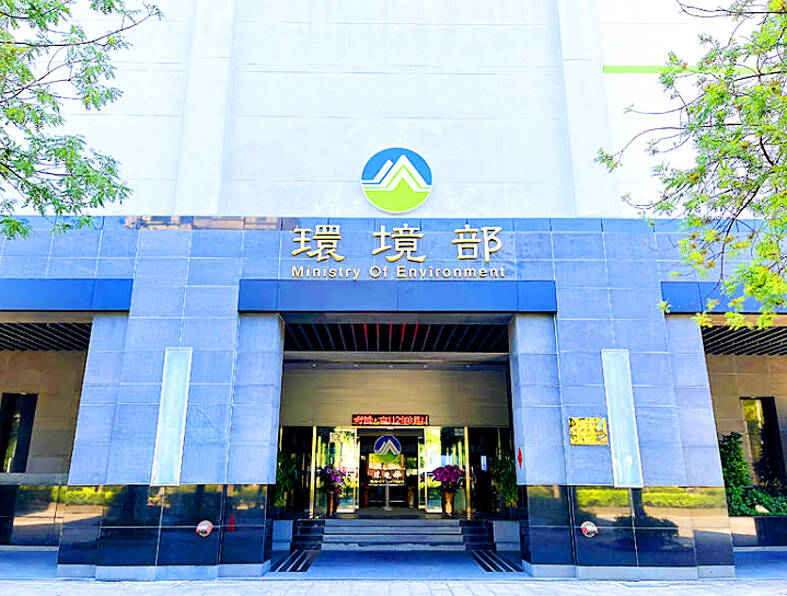Taiwan could lose billions of NT dollars worth of business opportunities from hosting major international expositions if the number of hotels securing a “green mark” issued by the Ministry of Environment remains so low, tourism experts said yesterday.
Local environmental protection departments are in charge of administering the certification for “Eco-Friendly Hotels,” which do not provide single-use toiletries or change guests’ bed sheets or towels daily. Hotels seeking to gain a certificate for a gold, silver or bronze-level green mark are subject to stricter evaluations by an impartial third party using higher criteria. Aside from not providing single-use toiletries, green mark hotels must also use energy-conserving lights and meet water conservation requirements.
Only 126 of the nation’s hotels have obtained a green mark.

Photo: Chen Chia-yi, Taipei Times
Taiwan has seen a significant increase in businesses in the post-COVID-19 era from hosting international conferences and exhibitions, particularly those on the semiconductor industry and artificial intelligence, Takming University of Science and Technology Department of Marketing Management director Sean Kao (高鵬翔) said.
“Business travelers from overseas come to participate in conferences and exhibitions in Taiwan and do some sightseeing as well, which helps bring in a new set of business opportunities for the travel industry,” Kao said. “If Taiwan hopes to host more international conferences and exhibitions, we must then consider issues related to the environment, society and corporate governance when hosting these events, from the selections of venues to hotels and accommodation.
When it comes to sustainability, guests tend to give more credit to a hotel with a green mark, Kao added.
The Ministry of Environment’s green mark certification system was created by referring to Canada’s green leaf eco-rating program, Kao said.
“While most international conferences and exhibitions are in northern Taiwan, only about 40 hotels in Taipei, New Taipei City and Taoyuan have obtained a green mark, which is not enough,” Kao said.
“Hoteliers might lose business opportunities brought by hosting conferences and exhibitions if they do not keep up with the trend of pursuing sustainability,” he added.
Many hotels might lack motivation to secure a green mark because it means that they would have to change their facilities to conserve water and energy, which might not guarantee an increase in business, Kao said.
“Encouraging hoteliers to obtain a green mark requires interdepartmental efforts: the Ministry of Environment should ensure that they follow all the required procedures to secure the certificate; the Tourism Administration should help hoteliers transition to a sustainable operation by subsidizing them in changing facilities; and the Ministry of Economic Affairs should promote Taiwan’s eco-friendly and green mark hotels among participants of international conferences and exhibitions,” Kao said.
National Chi Nan University Department of Tourism, Leisure and Hospitality Management associate professor Tseng Hsi-peng (曾喜鵬) said that a green mark should be something that the Tourism Administration uses to review the performance of hotels.
There should be a group of consultants to help obtain a green mark, Tseng added.

A preclearance service to facilitate entry for people traveling to select airports in Japan would be available from Thursday next week to Feb. 25 at Taiwan Taoyuan International Airport, Taoyuan International Airport Corp (TIAC) said on Tuesday. The service was first made available to Taiwanese travelers throughout the winter vacation of 2024 and during the Lunar New Year holiday. In addition to flights to the Japanese cities of Hakodate, Asahikawa, Akita, Sendai, Niigata, Okayama, Takamatsu, Kumamoto and Kagoshima, the service would be available to travelers to Kobe and Oita. The service can be accessed by passengers of 15 flight routes operated by

GIVE AND TAKE: Blood demand continues to rise each year, while fewer young donors are available due to the nation’s falling birthrate, a doctor said Blood donors can redeem points earned from donations to obtain limited edition Formosan black bear travel mugs, the Kaohsiung Blood Center said yesterday, as it announced a goal of stocking 20,000 units of blood prior to the Lunar New Year. The last month of the lunar year is National Blood Donation Month, when local centers seek to stockpile blood for use during the Lunar New Year holiday. The blood demand in southern Taiwan — including Tainan and Kaohsiung, as well as Chiayi, Pingtung, Penghu and Taitung counties — is about 2,000 units per day, the center said. The donation campaign aims to boost

MORE FALL: An investigation into one of Xi’s key cronies, part of a broader ‘anti-corruption’ drive, indicates that he might have a deep distrust in the military, an expert said China’s latest military purge underscores systemic risks in its shift from collective leadership to sole rule under Chinese President Xi Jinping (習近平), and could disrupt its chain of command and military capabilities, a national security official said yesterday. If decisionmaking within the Chinese Communist Party has become “irrational” under one-man rule, the Taiwan Strait and the regional situation must be approached with extreme caution, given unforeseen risks, they added. The anonymous official made the remarks as China’s Central Military Commission Vice Chairman Zhang Youxia (張又俠) and Joint Staff Department Chief of Staff Liu Zhenli (劉振立) were reportedly being investigated for suspected “serious

ENHANCING EFFICIENCY: The apron can accommodate 16 airplanes overnight at Taoyuan airport while work on the third runway continues, the transport minister said A new temporary overnight parking apron at Taiwan Taoyuan International Airport is to start operating on Friday next week to boost operational efficiency while the third runway is being constructed, the Ministry of Transportation and Communications said yesterday. The apron — one of the crucial projects in the construction of the third runway — can accommodate 16 aircraft overnight at the nation’s largest international airport, Minister of Transportation and Communications Chen Shih-kai (陳世凱) told reporters while inspecting the new facility yesterday morning. Aside from providing the airport operator with greater flexibility in aircraft parking during the third runway construction,